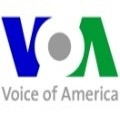The Security Council voted unanimously to impose strict sanctions on North Korea, overcoming objections from Russia and China by excluding the threat of military force. Resolution 1718 clears the way for the toughest international action against Pyongyang since the end of Korean War. It bars the sale or transfer of material that could be used to make nuclear, biological, and chemical weapons or ballistic missiles, and it prohibits trade with North Korea in luxury goods.
But Dmitri Siderov, Washington bureau chief of the Moscow daily Kommersant, says the significance of Russia's vote has been overblown. "The Russians agreed to go to for the sanctions mainly because they set up pre-condition will vote for UN security council resolution only if this resolution will exclude the use of military force against North Korea. I'd rather call it a failure than a success, because the resolution which 15 countries voted for would mean nothing to North Korea.It is not punishing. China controls 70 % of export goods to North Korea, the major North Korea trade partner." However, Jehangir Pocha, Beijing correspondent for the Boston Globe, says it is an encouraging sign that earlier this week China actually began inspecting cargo trucks traveling to North Korea, although it has not agreed to inspect ships at sea. Furthermore he observes that China is starting to construct a border fence with North Korea. "China's largest concern has always been it is North Korea's falls into chaos. It'll get flooded with refugees." And he notes that in the long run Beijing must calculate the possibility of North and South Korea eventually reuniting, which helps explain China's reluctance to antagonize Pyongyang. North Korea's other major trading partner is South Korea. And Sung Joon Kim, Washington correspondent for the Seoul Broadcasting System, says the South is not entirely happy with the resolution although Seoul has announced it'll support the UN pivisions. "Korea has long been trying to embrace North Korea with its so-called 'sunshine policy' that interests the South Korea to help North Korea economically and politically stable. But now the North conducted nuclear test and South Korea knows that the UN resolution will force the Korea government to give up the sunshine policy at least for now. " On the other hand, Japan is wholly behind the Security Council sanctions against North Korea, as Ken Karube of the Jiji Press wire service explains. "Japan is the country which is facing a direct threat from North Korea. So Japanese government welcomes the resolution and cooperation by the international community. Mr.Frankly I am not sure if China will implement this resolution. But this time, China, a long time friend of North Korea has joined the UN resolution. This is a big thing, not only for Japan, but also international community. It is very important for the international community to show unity, to tell North Korea to prevent the second trial." However some of America's European allies - and especially Germany - are less enthusiastic about the sanctions against North Korea, according to Matthias Rueb, Washington bureau chief of the Frankfurter Allgemeine Zeitung. He says Berlin's position mirrors that the rest of European Union which officially backs the sanctions. "But in the public, there is still discussion whether it makes sense to impose sanctions on the countries like North Korea. And whether the US should not try to enter direct bilateral talks with Pyongyang. I think you have to keep in mind that there is a strong under current European societies that especially, I think, it's true for Germany there is a perception that nuclear weapons are evil regardless who possess them. " Meanwhile U.S. Secretary of State Condoleezza Rice is traveling to Japan, South Korea, China, and Russia to marshal strong support for implementing the UN Security Council resolution. U.S. officials say that American spy satellites have detected vehicle movements in North Korea that may signal preparations for another nuclear test.

